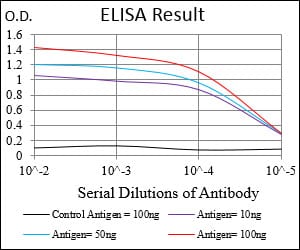

| WB | 1/500 - 1/2000 | Human,Mouse,Rat |
| IF | 咨询技术 | Human,Mouse,Rat |
| IHC | 咨询技术 | Human,Mouse,Rat |
| ICC | 技术咨询 | Human,Mouse,Rat |
| FCM | 咨询技术 | Human,Mouse,Rat |
| Elisa | 1/10000 | Human,Mouse,Rat |
| Aliases | PVA; CDHF6 |
| Entrez GeneID | 1830 |
| clone | 6G2E2 |
| WB Predicted band size | 107.5kDa |
| Host/Isotype | Mouse IgG1 |
| Antibody Type | Primary antibody |
| Storage | Store at 4°C short term. Aliquot and store at -20°C long term. Avoid freeze/thaw cycles. |
| Species Reactivity | Human |
| Immunogen | Purified recombinant fragment of human DSG3 (AA: 55-159) expressed in E. Coli. |
| Formulation | Purified antibody in PBS with 0.05% sodium azide. |
+ +
以下是关于DSG3抗体的3篇代表性文献摘要:
---
1. **文献名称**: *Autoantibodies against a novel epithelial cadherin in pemphigus vulgaris, a disease of cell adhesion*
**作者**: Amagai M, Klaus-Kovtun V, Stanley JR (1991)
**摘要**: 该研究首次证实DSG3是寻常型天疱疮(PV)患者自身抗体的主要靶抗原。通过免疫沉淀和免疫印迹实验,发现PV患者血清中的IgG抗体特异性识别DSG3.破坏表皮细胞间黏附,揭示了该抗体在疾病发生中的核心作用。
---
2. **文献名称**: *Targeted disruption of the pemphigus vulgaris antigen (desmoglein 3) in mice causes loss of keratinocyte cell adhesion with a phenotype similar to pemphigus vulgaris*
**作者**: Stanley JR, Amagai M (1996)
**摘要**: 通过构建DSG3基因敲除小鼠模型,研究显示缺乏DSG3会导致表皮细胞黏附缺陷,模拟了人类PV的病理特征。进一步支持了DSG3抗体通过干扰桥粒结构导致皮肤水疱形成的机制。
---
3. **文献名称**: *Development of an ELISA for rapid detection of anti-desmoglein 3 antibodies in pemphigus vulgaris*
**作者**: Ishii K, Amagai M, Hall RP et al. (1997)
**摘要**: 研究者开发了一种基于重组DSG3蛋白的ELISA检测方法,可高效、特异地检测PV患者血清中的DSG3抗体。该方法具有高敏感性和特异性,为临床诊断和疾病活动监测提供了重要工具。
---
**补充说明**:
以上文献均为DSG3抗体研究领域的基石性工作,涵盖靶抗原发现(文献1)、致病机制(文献2)及临床诊断(文献3)。近年研究更多聚焦于抗体亚型分析、表位定位及靶向治疗(如单克隆抗体或B细胞疗法),但上述经典研究仍被广泛引用。
Desmoglein 3 (DSG3) is a transmembrane glycoprotein belonging to the desmoglein family, which plays a critical role in cell-cell adhesion via desmosomes in epithelial tissues. It is predominantly expressed in stratified squamous epithelia, particularly in the skin and mucous membranes. DSG3 interacts with other desmosomal components, such as desmocollins and plakoglobin, to maintain tissue integrity by forming calcium-dependent adhesion complexes.
DSG3 is a major autoantigen in pemphigus vulgaris (PV), a life-threatening autoimmune blistering disorder. In PV, autoantibodies against DSG3 disrupt desmosomal adhesion, leading to acantholysis (separation of epidermal cells) and blister formation. These pathogenic antibodies interfere with DSG3's homophilic or heterophilic binding, impairing cell cohesion. While DSG1 autoantibodies are linked to cutaneous blisters, DSG3 antibodies are primarily associated with mucosal involvement in PV. However, some patients exhibit both DSG1 and DSG3 antibodies, correlating with combined mucocutaneous symptoms.
Diagnostically, DSG3 antibody detection via ELISA or indirect immunofluorescence aids in confirming PV and monitoring disease activity. Therapeutically, treatments target antibody production (e.g., corticosteroids, rituximab) or directly block pathogenic interactions. Research continues to explore DSG3-specific immunomodulatory therapies, including monoclonal antibodies or peptide-based approaches, to improve precision in managing pemphigus and related disorders.
×